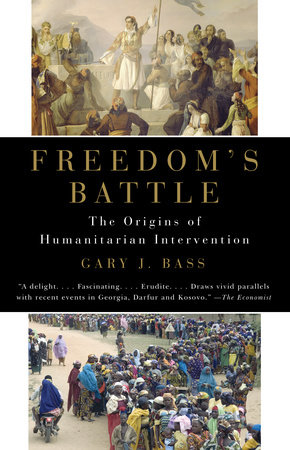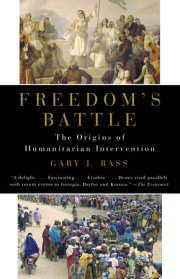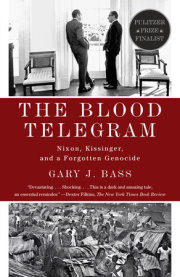Introduction
The president of the United States, in his State of the Union speech, gave a grave warning to the American people. He noted that overseas "there are occasional crimes committed on so vast a scale and of such peculiar horror" that the United States had a duty to step in. "In extreme cases action may be justifiable and proper." In a few cases, depending on "the degree of the atrocity and upon our power to remedy it," the president argued, "we could interfere by force of arms . . . to put a stop to intolerable conditions." This was an explicit call for using U.S. troops to save foreigners. It was not from Bill Clinton or Jimmy Carter—the two presidents who claimed to make human rights a centerpiece of their foreign policy. The president was Theodore Roosevelt; the year was 1904; his example was Cuba, where Roosevelt had famously put his own neck on the line against Spanish atrocities. 1
This was familiar rhetoric. Roosevelt's audience would not have been scandalized or confused by his words on this formal occasion. The president of the United States gave a ringing message about what we today would call humanitarian intervention, in ways that would be stunning almost a century later, and nobody thought too much of it. Something has been lost since then. The tradition of humanitarian intervention once ran deep in world politics, long before Rwanda and Kosovo came to the world's fitful attention. Over a century ago, it was a known principle that troops should sometimes be sent to prevent the slaughter of innocent foreigners. That principle has recently reemerged with fresh strength in the aftermath of the Cold War, but it is anything but new.
Human rights policies are usually thought of today as being largely an innovation of the Carter presidency, making another appearance in the Clinton administration—or, at most, going back to Woodrow Wilson. Before that, on this account, international politics were run by hard-nosed diplomats, unsentimental about foreign lives and liberties but dedicated to maintaining the balance of power. The fate of the world was worked out at lordly conferences in Vienna, Paris, and Berlin, behind closed doors thick enough to shut out the hubbub of mass opinion. This common belief that humanitarianism has no real historical standing has been used powerfully to oppose U.S. and European missions abroad.
But in fact, the century
before Wilson's presidency was anything but an age of unbroken realpolitik. Especially in Victorian Britain, this was a period rich in what we today would recognize clearly as human rights rhetoric, all the way up to the highest levels. This was the time of the antislavery campaign in Britain, and then of the mass uproar against vicious Belgian colonial rule in the Congo. It was the era of philhellenism in Britain and pan-Slavism in Russia, of liberal sympathy for the national minorities crushed by the Ottoman and Austrian and Russian empires, of intrusive and sovereignty-defying treaties to safeguard minority rights, of French solicitude for Syria's Christians, and of wild popular convulsions in British politics on behalf of the Bulgarians. The most magical names—from Byron to Dostoevsky—entered the lists on behalf of foreign suffering. 2
These emotional pleas were a regular feature of international politics throughout much of the nineteenth century, resulting in several important military missions. The basic ideas go all the way back to Thucydides, who, horrified at bloody ancient civil wars, hoped for the endurance of "the general laws of humanity which are there to give a hope of salvation to all who are in distress." As early as 1625, in his classic
De Jure Belli et Pacis, Hugo Grotius argued,
If the Injustice be visible, as if a
Busiris, a
Phalaris, or a
Thracian Diomedes exercise such Tyrannies over Subjects, as no good Man living can approve of, the Right of human Society shall not be therefore excluded. Thus
Constantine made War against
Maxentius and
Licinius; and other Roman Emperors against the
Persians, or threatned them with it at least, unless they left off persecuting Christians on the account of their Religion only.
Humanitarian intervention was once a relatively familiar European practice, and was understood as such—not just by the intervening countries, but even sometimes by the government whose sovereignty was being violated in the name of humanity. 3
All of the major themes of today's heated debates about humanitarian intervention—about undermining sovereignty or supporting universal human rights, about altruistic or veiled imperialistic motivations, about the terrible dangers of taking sides in civil wars and ethnic conflicts, about the role of public opinion and the press in shaping democratic foreign policy, about multilateral and unilateral uses of force, about the moral responsibility of political leaders—were voiced loud and clear throughout the nineteenth century. In their elegant cursive, in dispatches ornamentally sealed with red wax and delivered in safe boxes, the diplomats of a century and three-quarters ago were negotiating many of the same questions that Bill Clinton faced in Bosnia and Rwanda and that George W. Bush faced in Congo and Darfur. They knew things then that we have forgotten now.
Human Rights in History
Why do we let evil happen? Why do we sometimes rally to stop it? And, when we do act, how can we act more effectively? These are the core questions of this book. Good-hearted people all too often stand by in the face of enormous bloodshed overseas. As the British scholar Arnold Toynbee fumed, Mussolini could only get away with conquering Abyssinia because of "a negative, weak-willed, cowardly egotism" in Britain and France. The experience of past centuries must show a way to do at least a little better. 4
So this book has three overarching themes. First, humanitarian interventions are not just a newfangled experiment from the 1990s. Humanitarian intervention has a deep history, which is worth understanding both for its own sake and for the light it casts on current debates. Today's human rights advocates are neither faddish nor even particularly modern; they are the ideological and organizational descendants of the nineteenth century's activists against cruelty in remote places like Greece and Bulgaria.
This activism was not just a matter of imperialism. Unlike the recent advocates of a new kind of American human rights imperialism, I want to keep a bright line between empire and humanity. This book is, in part, a history of activists who campaigned against massacre abroad, while also frowning on the imperialism of their own country. There was a genuine humanitarianism at work in the making of some foreign policy in the nineteenth century, which was not the same thing as that era's imperialism. Of course, I do not mean to suggest that the whole of the nineteenth century was humanitarian—only that there were some important episodes even in a horribly imperialistic age, including several of the biggest foreign policy crises of the day. Rediscovering this long history levels the playing field in present-day debates between human rights advocates and more conservative realists, rather than leaving realists dominant as the exponents of traditional statecraft. Even in the heyday of imperialism and realpolitik, the politics of human rights made a big impact on foreign policy.
Nor was this only a matter of pan-Christian solidarity: of European Christians rescuing fellow Christians overseas. Christianity was certainly part of the story, but not the whole of it. Some of the most important activists hoped to save humanity, not just Christianity. Although much of the diplomatic attention focused on the Ottoman Empire, liberal Europeans also intervened in Naples, and argued for confronting Russia and Austria. Looking at the activists and listening in on the domestic debates about intervention, it was often the most Christian-identified actors who opposed intervention, while the more secular liberals supported it. Most strikingly, the Church of England opposed humanitarian intervention to rescue Greeks, Bosnians, and Bulgarians. Christian identity was a motive for some of the activists, but most Britons supporting the Greeks were drawn more by their pagan past than their Orthodox present. The British voiced substantial sympathy not just for suffering Christians, but also for Ottomans, Druzes, and enslaved Africans. The agitation over the Bulgarians in the 1870s paved the way to the modern human rights movement, with William Ewart Gladstone resoundingly speaking out on behalf of the human rights of Zulus and Afghans. 5
Second, this book looks at the way freedom at home can help promote freedom abroad. As domestic liberalism grew up in Britain, the United States, and, to some extent, France, the governments there found their foreign policy being pushed by their own homegrown freedoms: above all the power of a newly unshackled free press that could report on foreign atrocities; and then a free society that could react with horror at those atrocities, and politicians inside and outside the government jockeying for political power by trying to capture that public passion. The governments had to sit up and take notice when their so-called atrocitarians demanded heroic rescues of suffering populations, even when the mission would be in some obscure part of the world that served no strategic purpose—or undermined the government's realpolitik policy.
The new mass media played a particularly crucial role in pressuring a free government toward humanitarian intervention. These governments could not silence their own press, nor prevent them from reporting embarrassing news from inconvenient places. Skyrocketing newspaper circulations, better kinds of technology like the telegraph, increasing journalistic professionalism: all of this sometimes made it impossible for politicians to get away with quietly pursuing a foreign policy based on realpolitik. Once the press broke a gruesome story, the officials of a liberal state could find themselves under crushing pressure to respond. The exact placement of the reporters made a big difference. In short: humanitarian intervention is not new, and neither is the so-called CNN effect.
Before the rise of an effective and credible free press, the dark news of an atrocity overseas would reach the halls of power through ambassadors, consuls, or spies; if the government wanted, the information could be largely hidden from the public. But when the news came from the press, or from activist groups, then it went straight to the public. No matter how awkward it might be for their diplomacy, politicians in a free state could do little to stop their own newspapers from reporting hideous news—or to stop newspaper readers from reacting with shock and horror at what they read.
Sometimes senior government officials will genuinely care about suffering foreigners, as Madeleine Albright did for Bosnians and Kosovars, and George H. W. Bush reportedly did for Somalis. But successful politicians are often pretty cold fishes, and are more likely to take the risk of war if they are under pressure at home. So well-organized pressure groups, like today's human rights groups or the London Greek Committee in the 1820s, can have a powerful impact on a government's thinking. 6
Life was a little easier for despots. In unfree countries, like tsarist Russia, the government can censor the press, or control it so that it only reports stories that are convenient to the government's foreign policy. The state can feed its public the requisite propaganda to encourage only those foreign solidarities that help advance the state's imperialist or expansionist goals. And if the public gets too agitated, the state can try to use its repressive machinery to kill, jail, or cow the activists. None of those options is available to a political leader in a free country.
In other words, humanitarian intervention emerged as a fundamentally liberal enterprise, wrapped up with the progress of liberal ideals and institutions. Ideologically, it grew out of the radical ideas of freedom and the rights of man, a driving force in world politics since the French Revolution in 1789; institutionally, it grew up along with the rise of the mass media, public opinion, and responsive government. Even a little bit of liberalism, as seen in the nineteenth century's major constitutional states like Britain, can lead to surprisingly big effects in foreign policy. 7
Finally, there is something to be learned from the way that diplomats in the nineteenth century managed the practice of humanitarian intervention. After all, even limited humanitarian interventions—like any use of military force—carry enormous risks. They can be foils for imperialist conquest and occupation, draw big states into rivalry, or spark devastating wider wars between great powers.
Even if a president or prime minister has credible information about atrocities, and there is strong public sympathy for those victims, there must still be a cold realpolitik calculation about the costs of intervening. If the foreign murderers are relatively weak, it may be tempting to confront them. But if a humanitarian intervention would lead to a broader international crisis, or plunge the country—or the world—into a massive war, then most cabinets will decide that it is just not worth it. After all, governments are opportunistic in their humanitarianism, as they are with any military venture; believing in human rights does not make one suicidal.
Still, the diplomats of the nineteenth century developed some important ways to reduce the international dangers from a humanitarian intervention. They engaged in complex exercises in self-restraint to prove that their intentions were limited only to unselfish humanitarianism, rather than conquest or imperialism. These governments voluntarily limited the size and duration of their military missions; relied on specific treaties to delineate what could be called spheres of humanitarian interest; and engaged in successful multilateral practices of consultation that are as striking as anything ever dreamed of at the League of Nations or the United Nations.
The rest of this part of this book will be spent establishing and fleshing out these main arguments. First, there will be a challenge to the influential notion that "humanitarian" interventions are really just veiled imperialism. This will be followed by taking on the related argument that the nineteenth century's "humanitarian" interventions were actually pan-Christian missions, arguing instead that a broader humanitarianism was actually at work. Next comes a turn to domestic politics, looking at how the mass media shapes this sense of the fellow humanity of foreigners, and how domestic politics plays out in free and authoritarian states. Finally, there will be a look at the diplomacy of humanitarian intervention.
1. A Compilation of the Messages and Speeches of Theodore Roosevelt, 1901—1905, ed. Alfred Henry Lewis (New York: Bureau of National Literature and Art, 1906), supplemental vol. 2, p. 858. Clinton told U.S. troops bound for Kosovo, "If somebody comes after innocent civilians and tries to kill them en masse because of their race, their ethnic background or their religion, and it's within our power to stop it, we will stop it." (White House, Office of the Press Secretary, "Remarks by the President to the KFOR Troops," Skopje, Macedonia, 22 June 1999, 5:43 p.m. local time.)
2. David Brion Davis, Slavery and Human Progress (New York: Oxford University Press, 1984); Adam Hochschild, King Leopold's Ghost: A Story of Greed, Terror, and Heroism in Colonial Africa (New York: Houghton Mifflin, 1998).
3. Thucydides, History of the Peloponnesian War, trans. Rex Warner (London: Penguin, 1972), book 3, section 84, p. 245. Hugo Grotius, Of the Rights of War and Peace, trans. J. Barbeyrac (London: W. Innys and R. Manby, J. and P. Knapton, D. Brown, T. Osborn, and E. Wicksteed, 1738; orig. 1625), book 2, ch. 25, section 8, pp. 504—5. See David Halloran Lumsdaine, Moral Vision in International Politics: The Foreign Aid Regime, 1949—1989 (Princeton, N.J.: Princeton University Press, 1993), pp. 26—28.
4. Arnold J. Toynbee, Survey of International Affairs 1935: Volume II: Abyssinia and Italy (London: Royal Institute of International Affairs, 1936), p. 2.
5. On pan-Christianity, see Martha Finnemore, The Purpose of Intervention: Changing Beliefs About the Use of Force (Ithaca, N.Y.: Cornell University Press, 2003), pp. 52—84.
6. Walter Clarke and Jeffrey Herbst, eds., Learning from Somalia: The Lessons of Armed Humanitarian Intervention (Boulder, Colo.: Westview, 1997); Jon Western, Selling Intervention and War: The Presidency, the Media, and the American Public (Baltimore: Johns Hopkins University Press, 2005), pp. 133—74. Samantha Power, "A Problem from Hell": America and the Age of Genocide (New York: Basic Books, 2002), pp. 355—57; Ed Vulliamy, Seasons in Hell: Understanding Bosnia's War (New York: Simon and Schuster, 1994), pp. ix—x.
7. Lynn Hunt, Inventing Human Rights: A History (New York: W. W. Norton, 2007), pp. 15—26; Susan Maslan, "The Anti-Human," South Atlantic Quarterly, vol. 103, no. 2—3 (2004), pp. 357—74.
Copyright © 2008 by Gary J. Bass. All rights reserved. No part of this excerpt may be reproduced or reprinted without permission in writing from the publisher.









